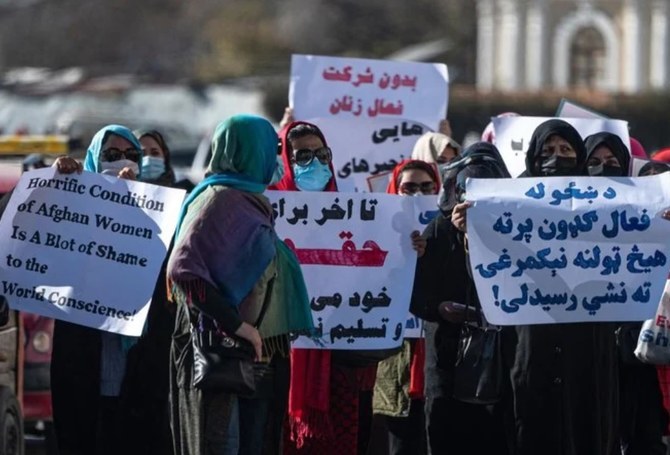LONDON: A lack of proficiency in English is stopping numerous women trapped in Afghanistan from being reunited with their husbands in the UK, British MPs have claimed.
The issue is particularly concerning given that the Taliban has banned women from leaving Afghanistan without a male companion, as well as prohibiting women’s education, making it very difficult for many to learn a second language.
Afghanistan has also closed all its English-language test centers, making it even harder to receive certification. Those wishing to do so must travel to neighboring Pakistan, which is complicated further by the Taliban’s travel rules.
The Independent reported that one British-Afghan man struggled to secure a visa for his wife and daughter to travel to Pakistan to undergo further tests to facilitate their relocation to the UK. His wife had been studying English in preparation for applying for a UK spousal visa before the Taliban took control of the country in 2021, and she has subsequently been prevented from continuing her studies.
“I can’t see my baby,” the man told the Independent. “I have paid around £7,000-8,000 ($8,900-10,000) in Home Office and solicitor’s fees. A decision needs to be taken because if something happens to my wife, who is going to be responsible?”
Another Afghan man, Hewaad Farhad, said he did not know how to get a spousal visa for his wife in Afghanistan due to her poor English and lack of ability to study it, as she cannot read or write.
“I grew up in the UK, my life — everything — is according to UK society,” he said. “In Afghanistan, I don’t have anything. I can’t work and it is dangerous being a British person living in Afghanistan.
“There are no English classes and no education for women,” he continued. “She hasn’t been to school and when she grew up she was living in a village far away from school and her father did not want her to go.”
Farhad’s wife said, through a translator: “It is very stressful here, it is very depressing living with just the kids. The kids and myself miss him so much.
“We are scared that we are going to get into trouble and I’m not safe here. Learning English is very difficult and challenging for me. Whatever it takes for me to get to the UK I want to do it.”
Green Party MP Caroline Lucas said that she had written to Immigration Minister Robert Jenrick over the issue, asking for a review of government policy.
“The Home Office’s cruel and callous inflexibility on English-language requirements is putting vulnerable refugees in danger and tearing families apart,” she said. “I have constituents with spouses and children stranded in Afghanistan who are at risk from the Taliban, have had no formal education so face enormous language barriers, and have no support network.
“These exceptional circumstances cannot be met with an obstinate and uncaring bureaucracy.”
Labour MP for Slough Tan Dhesi said: “Since the Taliban’s takeover, I have been approached by numerous Slough constituents in need, including those who simply want to reunite their families and ensure their safety. The government must address these serious concerns in this delicate and grave situation.”
Wendy Chamberlain MP, chair of the All-Party Parliamentary Group for Afghan women and girls, said: “Afghan women were promised support by the government when the Taliban seized power, but instead we have seen bureaucratic block after bureaucratic block put between them and reaching safety with their families.
“The government must apply common sense and compassion to its policies — whether it is biometrics or language requirements.”
A Home Office spokesperson told The Independent: “The UK has made an ambitious and generous commitment to help at-risk people in Afghanistan and, so far, we have brought around 24,600 vulnerable people to safety.
“The English language requirement was introduced so that those coming to the UK are able to contribute and integrate into society. We expect applicants to take these tests whenever possible but we will consider details of any exceptional circumstances for those unable to do so.”
Courtesy: arabnews







